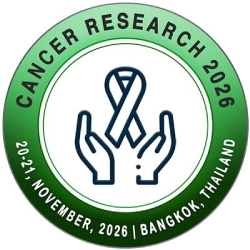.png)
Rajkumari Banashree Devi
Jawaharlal Nehru Institute of Medical Sciences, IndiaPresentation Title:
Immunophenotypic & clinico-hematological characteristics of de-novo acute promyelocytic leukemia cases detected over 5-year period in a tertiary hospital in Manipur, India
Abstract
Introduction: Acute myeloid leukemia (AML) is a genetically heterogeneous malignancy & most common subtype of leukemia in adults characterized by rapid progression and poor prognosis. Acute promyelocytic leukemia (APML) is a subtype of AML in which abnormal promyelocytes predominate and usually presents with t(15;17) (q22;q11-12), PML-RARA. APML accounts for 5-8% of AML cases, common in younger patients, with a lower relative frequency in elderly patients. Dreaded complications are disseminated intravascular coagulation and increased fibrinolysis. However, if detected early, the malignancy has very good prognosis. Flowcytometric & molecular genetic analyses are indispensable for fast diagnosis of these cases.
Materials & methods: Retrospective study conducted at Pathology department, JNIMS, Data were retrieved from all registers maintained in the Department of Pathology, between 2020-2024. Reports of flowcytometric analysis done with Beckman coulter analyzer were collected along with the molecular genetic analysis reports. Prior approval of the Institute Ethics committee was taken.
Results: Out of 22 cases diagnosed as APML from either peripheral blood smear or Bone marrow aspirate and biopsy samples. Median age of presentation was 39 years. Male: Female distribution was 1:2. The flowcytometry was carried on all 22 cases among which 14 were processed from Bone marrow aspirate samples and rest 8 cases from Peripheral blood sample. Flowcytometric immunophenotyping showed positivity for CD45, CD13, CD33, and MPO in all cases whereas CD117 positivity was noted in 90%, CD64 in 73% & CD38 in 64%. All cases were negative for CD34, HLA-DR, CD19, cCD22, CD79a, cCD3 & other T cell markers.
All of the APML cases have PML-RARA translocation. Conclusion: This study is mainly conducted because it is very crucial for timely diagnosis & early intervention in APML for a good outcome. Any delay in diagnosis & treatment lead to very poor outcome. Timely intervention in fact gives almost near normal lifespan for the patient.
Biography
Rajkumari Banashree Devi, born on February 22, 1967, in Imphal, Manipur, is a distinguished hematopathologist from the Meitei community. She holds an MD in Pathology from Manipur University and a DM in Hematopathology from PGIMER, Chandigarh. Currently serving as Professor (and former Head) of the Department of Pathology at Jawaharlal Nehru Institute of Medical Sciences (JNIMS), Imphal, she has made remarkable contributions to hematology and transfusion medicine. She has held several key positions, including Zonal Quiz Coordinator of ISHBT (2021–2024), Treasurer of the Manipur Society of Hematology and Transfusion Medicine, and Vice President of the North Eastern Hemophilia Consortium. She has presented research at international and national conferences, authored over 25 peer-reviewed papers, and led DST-funded research on G6PD deficiency. Her dedication to medical education and community health has earned her multiple appreciation awards from ISHTM and IMA-Manipur.


